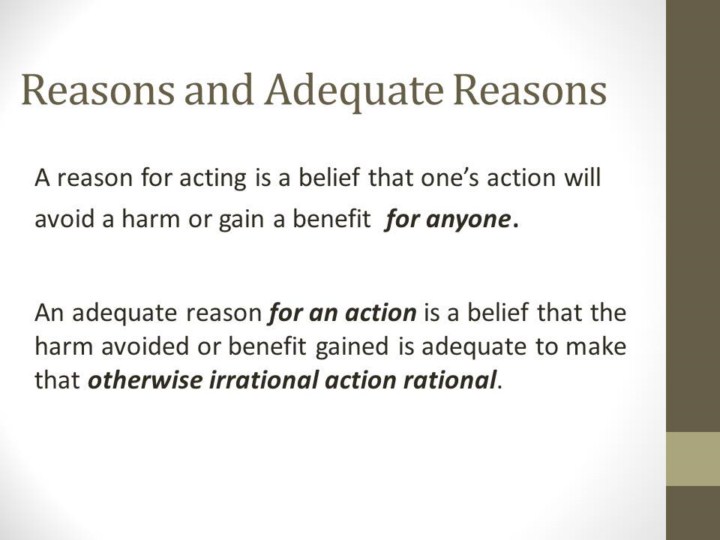| front |1 |2 |3 |4 |5 |6 |7 |8 |9 |10 |11 |review |
 |
A reason for acting is a belief that oneís action will avoid a harm or gain a good for anyone, not merely oneself. It is important to notice the difference between the statement of what counts as acting irrationally and the statement of what counts as a reason. (I did put the difference in Bold.) It is not irrational not to avoid a harm for someone else, especially if you do not care for that other person, or dislike him. One result of this is that it is not irrational to act immorally just because you feel like it, even though others are harmed by your immoral action. All rational persons want to avoid harm to themselves, and, insofar as they have control over their emotions, they do act to avoid harm to themselves unless they have an adequate reason not to. However, many rational people are not concerned with whether others avoid suffering harm, and do not act to avoid or prevent harm to others, simply because they donít feel like doing anything to help them. In fact, many people turn down requests to give to worthy charities simply because they donít want to be bothered. But a rational person can also be a very good person; she can make great personal sacrifices in order to help those who need help. That reasons are beliefs that oneís action will avoid a harm or gain a benefit for anyone, not just oneself, makes the account of rationality neutral rather than always siding with self-interest over morality. If the reason is strong enough it can make what would otherwise be an irrational action rational, so that avoiding a harm for someone else, even someone one doesnít even know, can make it rational to do something that you know will harm yourself. Soldiers who sacrifice their lives to save their buddies are considered to be acting heroically, not to be acting irrationally, the same is true of firefighters who risk their lives to save people they donít even know. However, someone who sacrifices his life to harm another person is acting irrationally, unless harming that person provides benefits to some other person. A reason must involve avoiding a harm or gaining a good for someone, that someone will be harmed is not a reason. It should be clear that by ďreasonĒ I do not mean ďa motive,Ē that is, a belief that motivates an action. Some motives are not reasons, e.g., a belief that my action will harm someone I do not like. Although such a belief may motivate a person, it cannot make an otherwise irrational action rational. A person who harms himself in order to harm another person is acting irrationally. Of course, if one can harm a person one does not like without harming oneself that is not irrational. Reasons for actions are limited to beliefs that oneís action will, directly or indirectly, avoid a harm or gain a benefit for someone. Only such beliefs can make it rational to do some action that one knows will be harmful to oneself. An adequate reason for an action is a belief that the harm avoided or benefit gained is adequate to make that otherwise action rational. On this account of rationality, I think that all of you want to act rationally, and none of you want to act irrationally, for to act irrationally is to harm yourself without anyone benefiting enough to compensate for the harm you suffer. Rationality is a powerful concept. However, it seems that it is going to be difficult to provide an account of an adequate reason that everyone will accept. Even rational people differ about whether avoiding one harm compensates for suffering a different harm, that is, rational people differ in what reasons they count as adequate. The difference in what people regard as an adequate reason is a direct consequence of the fact that people rank the harms and benefits differently. Even when only one person is involved, e.g., in end of life decisions, some people regard avoiding serious pain and suffering as an adequate reason for dying earlier than they would if they accepted proposed life-prolonging treatments and some people do not. I agree with standard legal and medical practice, any reason that a competent patient regards as adequate, is adequate. My major concern is not to label any action as irrational that any competent person would regard as rational. To label an action as irrational is a very serious business, it means that the action should not be done, and for many people it provides a morally adequate reason for overruling that personís decision. |